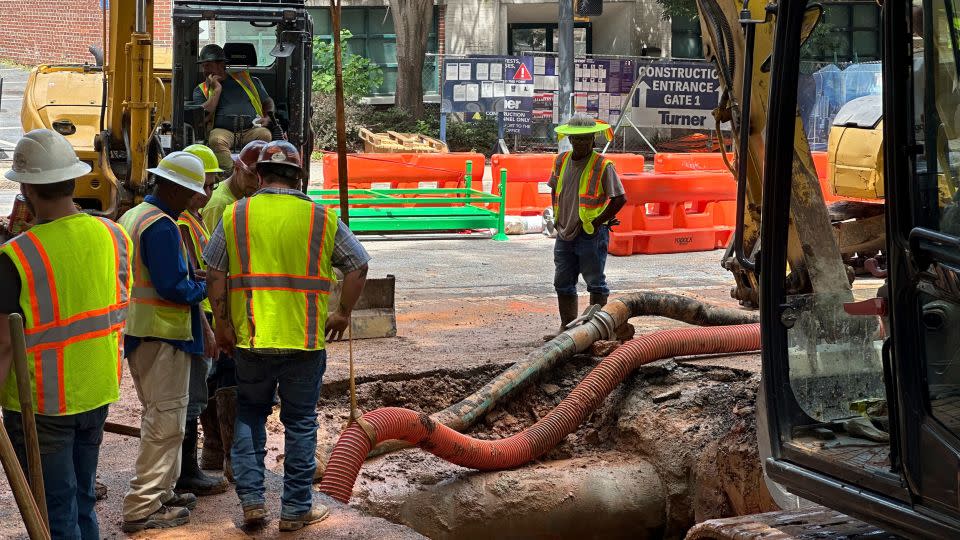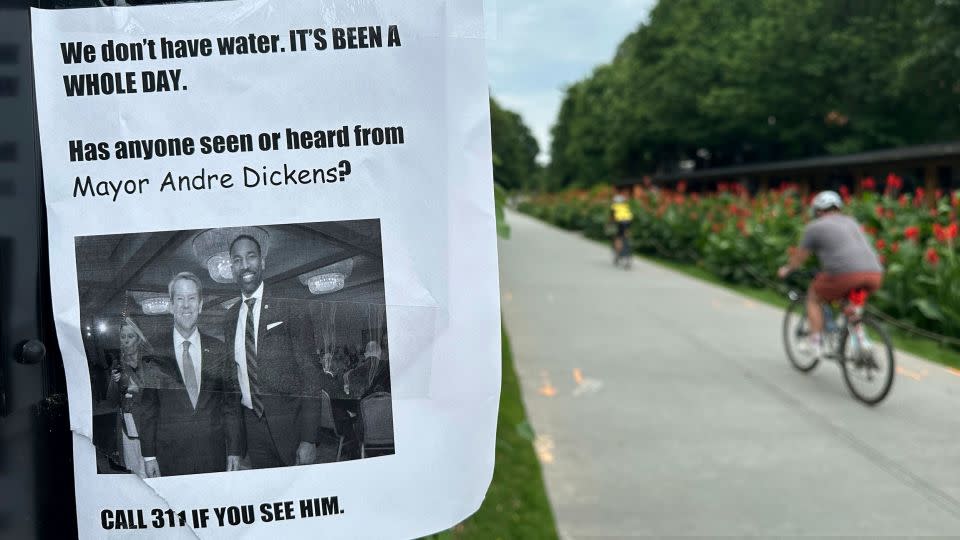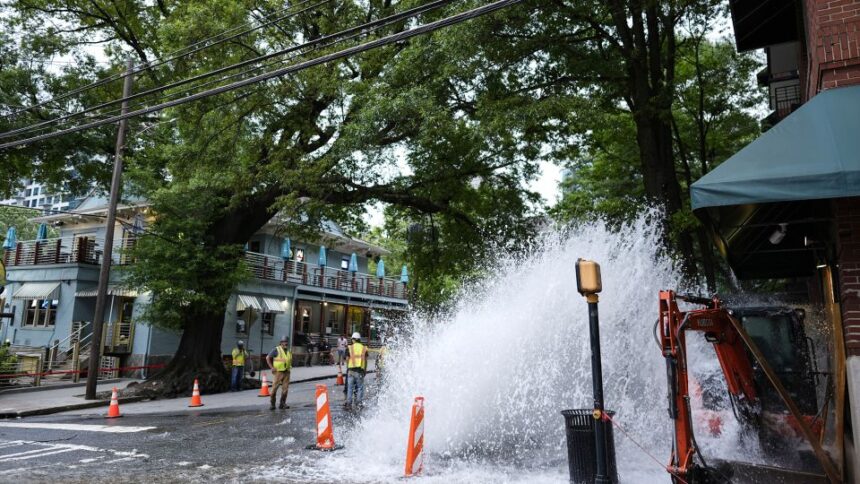Atlanta remains under a state of emergency Monday as it battles disruptions to its water service that began last week, leaving a swath of a major city under boil-water advisories and highlighting the pervasiveness of problems caused by America’s aging infrastructure.
“We are currently coordinating with the US Army Corps of Engineers. We have sought their assistance because they have the most experience in handling a crisis like this,” Mayor Andre Dickens announced in a statement Monday. “They will help us develop a plan to assess and evaluate our aging infrastructure.”
US Army Corps of Engineers will arrive Tuesday, city officials said.
“What we have found, in digging and digging and digging and looking at pipes, we are repairing pipes from 1920s, 1930s, 1940s, and our infrastructure is crumbling,” Atlanta Chief Operating Officer LaChandra Burks said at a Monday afternoon city council meeting.
City officials plan to partner with federal teams to assess how to improve the city’s infrastructure, she said, adding that while improvements will not prevent water main breaks, they will allow for quicker repairs.
The city has been plagued by water woes since Friday, when the first two of a series of water main breaks emerged along two pipes – one a 36-inch pipe, the other a 48-inch pipe – that Dickens said were about a century old. One of the pipes that failed was installed in 1910, while another dated to 1930, the mayor said.
Repairs were completed on one break near downtown Saturday evening, hours before Dickens declared a state of emergency. On Monday, the city’s watershed management department lifted a boil water advisory that had been in effect since Friday for the area. City officials said public water was safe to use for all purposes.
Repairs on the other break, at 11th and West Peachtree streets in Midtown, have yet to be completed, and crews were working on it Monday. Around 1 a.m., crews began turning off water to several blocks within the area, causing a geyser erupting from the break to eventually dissipate, Dickens said at a news conference held at the scene later in the day. His administration is “laser-focused” on addressing the issue, he said. A boil water advisory remained in place Monday for that area, city officials said.
Officials were “pleased with the direction that the repairs are going now,” said Al Wiggins Jr., the director of the city’s Department of Watershed Management. He would not provide a timeline for the restoration of service.

As of Monday morning, officials did not have a reason to believe the water main breaks were connected, Wiggins said, though he noted crews had not yet been able to conduct a thorough inspection in Midtown.
Dickens said there were “some minor breaks” Sunday, two of which he visited: one at 1190 Atlantic Ave., near the Atlantic Station shopping district, and the other in the city’s Candler Park neighborhood. The Department of Watershed Management said repairs were completed on the latter by Sunday afternoon, restoring water to 35 homes.
Fire and police officials who also spoke at the Monday news conference said their departments are distributing water in areas where water has been turned off and emphasized that first-responder services have not been impacted.
Collectively, the breaks and repairs in progress have left parts of the city without water or under boil water advisories, forcing businesses and tourist attractions including the Georgia Aquarium and World of Coca-Cola to shut down. Events, including two Megan Thee Stallion concerts scheduled for Friday and Saturday at State Farm Arena, were postponed.
The disruptions prompted Emory University Hospital Midtown to transfer dialysis patients to other hospitals and divert ambulances from its emergency department – though it resumed normal operations on Sunday, a spokesperson said.
Atlanta Public Schools’ summer school and programs were not held Monday, and programs “will reconvene once the boil water advisories have been lifted,” a notice from the school district said. Non-essential employees have been told to work remotely.
On Monday, the mayor announced there will be a financial relief program to help “small businesses impacted by the recent water crisis.” The program will provide funds to businesses who faced losses as a result of the water issues, Dickens said, urging residents to “stay tuned for more details on how to apply.”
In the meantime, the city has designated six fire stations where impacted residents are able to pick up water, according to the Department of Watershed Management.
“I know it has been a tough and frustrating day for many of you,” Dickens said Saturday in declaring the state of emergency, which allows the city to expedite access to resources for the repairs. “We all take this matter very seriously.”
Atlanta’s troubles in recent days are indicative of a broader issue with decaying infrastructure across the country. In the US and Canada, around 260,000 water main breaks cost $2.6 billion each year, according to a December 2023 study from Utah State University.
The study noted the average age of failing water mains is around 53 years and 33% of US and Canadian water mains are over 50 years old.
‘I take it seriously,’ mayor says of criticism


Dickens and the city have faced criticism in the wake of the water main breaks, in part over the pace of the response.
The mayor – who’s up for reelection next year – said at a news conference this weekend he was in Memphis, Tennessee, on Friday.
He was in touch with members of his administration “every hour,” he said, prior to his return Saturday. “I was gone for less than 24 hours, and then I came right back,” he said.
Dickens said he would address the criticism “head on,” telling CNN’s Kate Bolduan he had committed to updates every two hours to keep residents informed through the weekend.
“I take it seriously, I take it to heart,” Dickens said of the criticism. “Residents wanted to see more of me Saturday morning before the 2 p.m. press conference. I understand that, and I apologize.”
According to a statement from a city spokesperson, when Dickens left Atlanta, officials had not yet realized the severity of the breaks.
Dickens did not take questions at Monday’s news conference, which officials abruptly ended after a resident who appeared upset repeatedly asked Wiggins about the status of repairs and when the water would be turned back on.
This is a developing story and will be updated.
CNN’s Ryan Young contributed to this report.
For more CNN news and newsletters create an account at CNN.com











